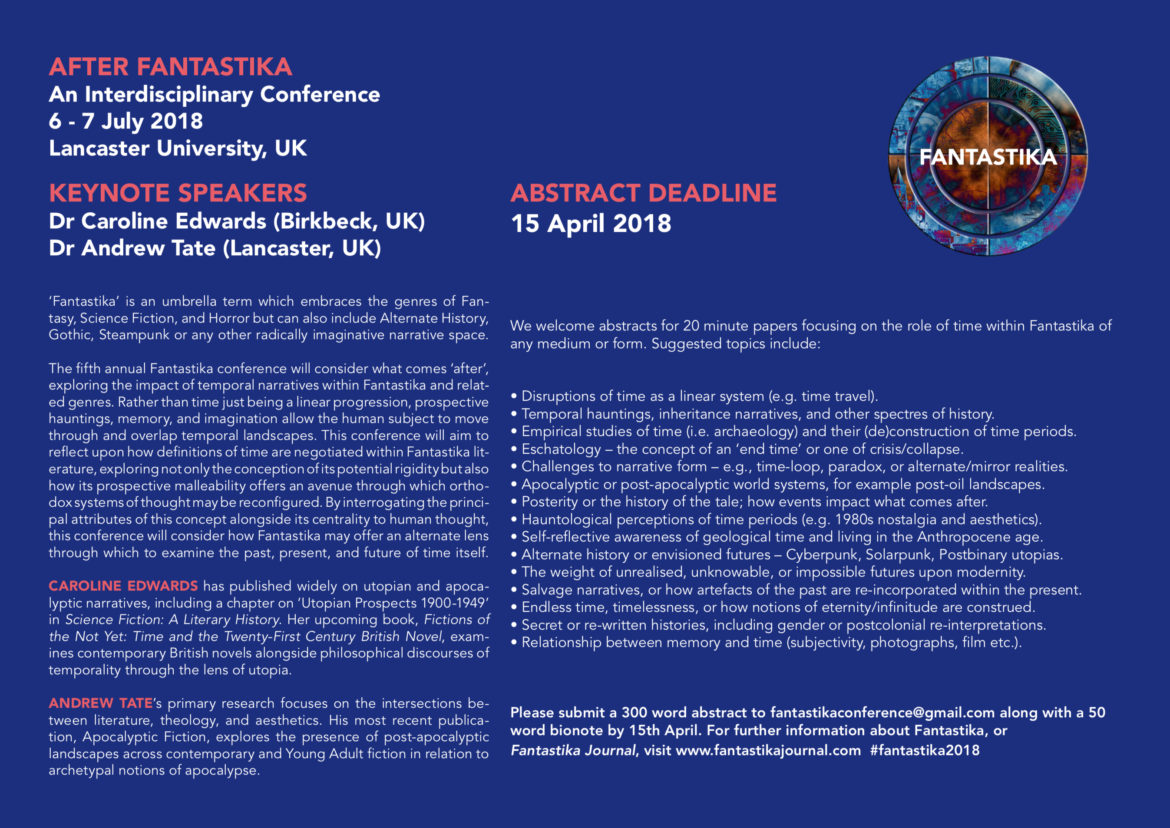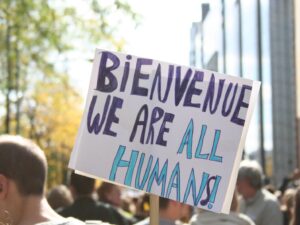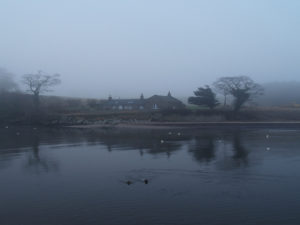
AFTER FANTASTIKA
An Interdisciplinary Conference 6 – 7 July 2018
Lancaster University, UK
KEYNOTE SPEAKERS
Dr Caroline Edwards (Birkbeck, UK)
Dr Andrew Tate (Lancaster, UK)
ABSTRACT DEADLINE
15 April 2018
‘Fantastika’ is an umbrella term which embraces the genres of Fan- tasy, Science Fiction, and Horror but can also include Alternate History, Gothic, Steampunk or any other radically imaginative narrative space.
The fth annual Fantastika conference will consider what comes ‘after’, exploring the impact of temporal narratives within Fantastika and relat- ed genres. Rather than time just being a linear progression, prospective hauntings, memory, and imagination allow the human subject to move through and overlap temporal landscapes. This conference will aim to re ect upon how de nitions of time are negotiated within Fantastika lit- erature, exploring not only the conception of its potential rigidity but also how its prospective malleability offers an avenue through which ortho- dox systems of thought may be recon gured. By interrogating the princi- pal attributes of this concept alongside its centrality to human thought, this conference will consider how Fantastika may offer an alternate lens through which to examine the past, present, and future of time itself.
CAROLINE EDWARDS has published widely on utopian and apoca- lyptic narratives, including a chapter on ‘Utopian Prospects 1900-1949’ in Science Fiction: A Literary History. Her upcoming book, Fictions of the Not Yet: Time and the Twenty-First Century British Novel, exam- ines contemporary British novels alongside philosophical discourses of temporality through the lens of utopia.
ANDREW TATE’s primary research focuses on the intersections be- tween literature, theology, and aesthetics. His most recent publica- tion, Apocalyptic Fiction, explores the presence of post-apocalyptic landscapes across contemporary and Young Adult ction in relation to archetypal notions of apocalypse.
We welcome abstracts for 20 minute papers focusing on the role of time within Fantastika of any medium or form.
Suggested topics include:
• Disruptions of time as a linear system (e.g. time travel).
• Temporal hauntings, inheritance narratives, and other spectres of history.
• Empirical studies of time (i.e. archaeology) and their (de)construction of time periods. • Eschatology – the concept of an ‘end time’ or one of crisis/collapse.
• Challenges to narrative form – e.g., time-loop, paradox, or alternate/mirror realities.
• Apocalyptic or post-apocalyptic world systems, for example post-oil landscapes.
• Posterity or the history of the tale; how events impact what comes after.
• Hauntological perceptions of time periods (e.g. 1980s nostalgia and aesthetics).
• Self-re ective awareness of geological time and living in the Anthropocene age.
• Alternate history or envisioned futures – Cyberpunk, Solarpunk, Postbinary utopias.
• The weight of unrealised, unknowable, or impossible futures upon modernity.
• Salvage narratives, or how artefacts of the past are re-incorporated within the present. • Endless time, timelessness, or how notions of eternity/in nitude are construed.
• Secret or re-written histories, including gender or postcolonial re-interpretations.
• Relationship between memory and time (subjectivity, photographs, lm etc.).
Please submit a 300 word abstract to fantastikaconference@gmail.com along with a 50 word bionote by 15th April. For further information about Fantastika, or Fantastika Journal, visit www.fantastikajournal.com #fantastika2018



